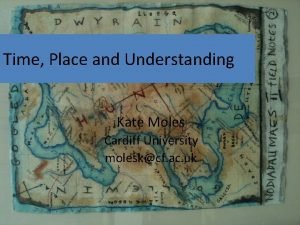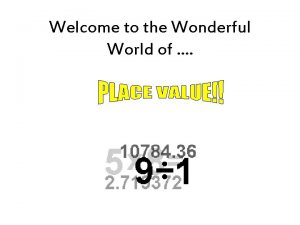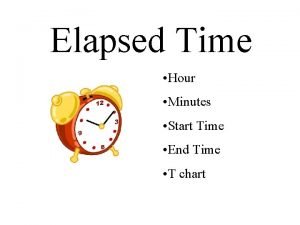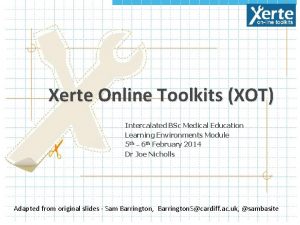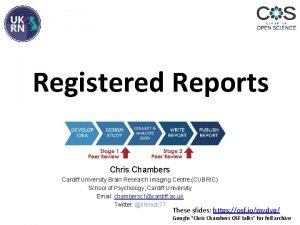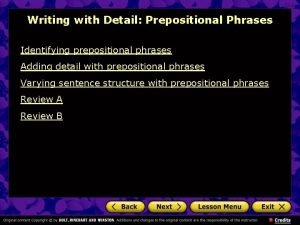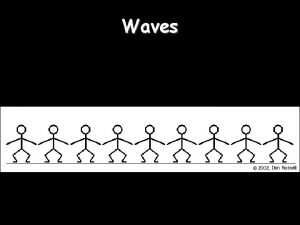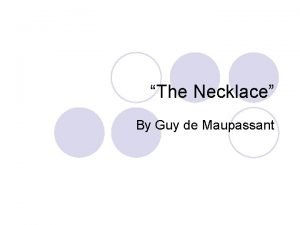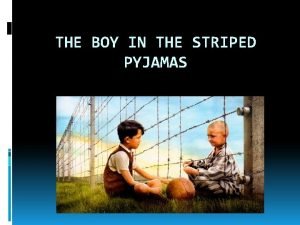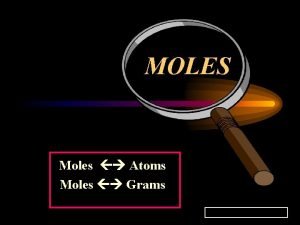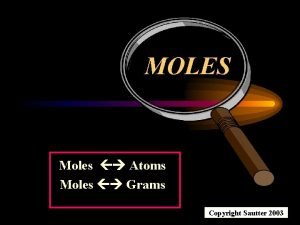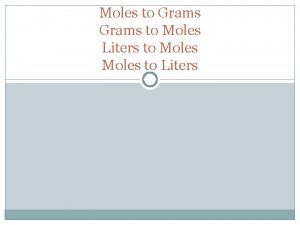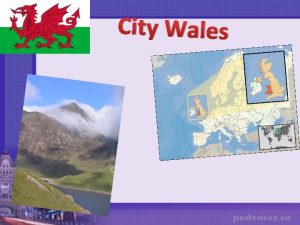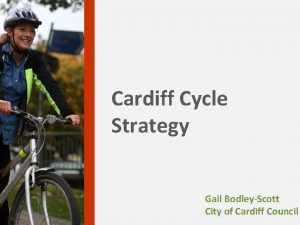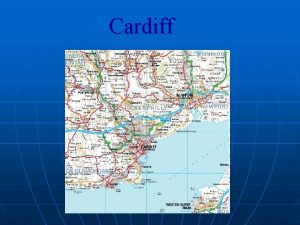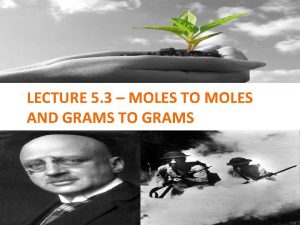Time Place and Understanding Kate Moles Cardiff University












![B Well I am not from [town], but as a child I used to B Well I am not from [town], but as a child I used to](https://slidetodoc.com/presentation_image/87e8193eb8809350a96e176ed46d8ccd/image-13.jpg)





![Fieldnotes: I then drove up to [place in town] to meet S. As I Fieldnotes: I then drove up to [place in town] to meet S. As I](https://slidetodoc.com/presentation_image/87e8193eb8809350a96e176ed46d8ccd/image-19.jpg)



- Slides: 22

Time, Place and Understanding Kate Moles Cardiff University molesk@cf. ac. uk

What is place? ‘the fish don’t talk about the water’ Cresswell (2000)

Time in a research setting • • • Time and place Timespace Rhythm Fieldwork and time Traces

Young People and Place • Ethnographic research • Young people’s understanding and use of public and private spaces in their community in the South Wales valleys • In media res • Evolving relationships/ evolving methods • Different times and places of the research

The times and places of the research • • Schools Youth clubs ‘The street’ Skate park

Three layers of temporality • Participant’s accounts • Time in a research setting • The rhythms of research

Participant’s accounts • How the temporal is used to order accounts of the young people’s interactions with place • Places as temporal, subject to change, fluid and linked to past-places and future-places • Place as a verb, not a noun

Aged places Participant: up there up by the fence that’s where the jumps were KM: yes P: so you’d turn sharp and jump them KM: that’s brilliant P: cos they were massive KM: and who did that, you and what other boys? P: ah it was like older boys who built them KM: mm? P: it was older boys who built them first KM: yes P: it’s like. . . the older boys built them and then we just started using them after and KM: yes P: and they like didn’t want to go up there anymore cos they were like going to better places

Times of the day Participant: I go down there every now and again like with my friends like in the morning Interviewer: yes, yes P: cos like the adults the older boys don’t come down till like 2 o’clock I: ok P: so it’s like all right till then I: ok so weekends on the morning P: yes I: would you go before school? P: yes. . . no I don’t go before school I: no, that would be too early would it? P: yes! I: (laughs) so ok so in the morning you’d go down there, but not in the evening or afternoons at the weekend P: no like when in the Christmas holidays when I had a new bike me and my cousin and my friend used to go down there like at 8 o’clock in the morning so there was noone, we’d learn new stuff it would be empty and like no-one would come down till like 12 o’clock something like that so we’d have a couple of hours on our own I: yes as soon as others arrive you just leave do you? P: yes

• Places are… ‘not made up of simple linear histories, which stretch from the past in smooth lines towards a vanishing point in the far off future. Histories scrumple up, times past pop into the present, modifying them for all time. [Places] in the present wobble as stories from the future and the past shimmer in front of them’ (Battista et al, 2005: 439)

Historically connected/ contemporarily disconnected places BD: Mme hmm. How come you go down to Ponty? Res: Cos, well, cos you can only go down to Ponty. You can’t go up to like Neath or Swansea up there. You can’t because of the like tracks being taken apart so you can only go down west at Cardiff, Newport and up to Bristol then and down that way. You can’t go up to the opposite direction. You can go down to Cardiff. Um, I don’t know why, it hasn’t been there for. They took the track out about twenty odd years ago. BD: Aha Res: So you can’t go to Swansea or Neath or Brecon. You know, you go to Cardiff. The track’s obviously not there. The track stops in [nearby town]it is.

Generational difference Becca was up at her nan’s house interviewing her mum for the other project, so I came in with S. Once inside, SD checked her mum was ok, went over to her, hugged her, and having seen she was, visibly relaxed. We went through into the kitchen where showed me her two kittens, Axel and Rose. We chatted a bit about the kittens and about the big boxer dog that her nan had who was prowling around the kitchen, before heading back into the living room to sit in on Becca’s interview. S began adding to this interview a bit. S’s nan came in then, from being out shopping. A beautiful older lady, she came in and they all began reminiscing about how [town] had changed, across their three generations living there. The differences were big – when S’s nan was younger [town] had been at the centre of the valleys – a cultural and shopping centre, where people had travelled to from across the valleys. S’s mum had remembered being brought there as a child, but had witnessed its demise during her time living here. S was a bit shocked at how it had been, saying there was nothing here now…Their experiences of [town] were quite different, as were their location within it and relationship to it. For S’s nan, [town] had been a position from which she could travel from, somewhere she felt enabled her to do things from. It was a place that people traveled to, knew about, somewhere significant, which empowered her. For S and her mum, it wasn’t like that – it was somewhere they were trapped, even though they both felt it had lots of positives.
![B Well I am not from town but as a child I used to B Well I am not from [town], but as a child I used to](https://slidetodoc.com/presentation_image/87e8193eb8809350a96e176ed46d8ccd/image-13.jpg)
B Well I am not from [town], but as a child I used to come up here. I used to- this used to be our day out, [town] park- oh, brilliant. Dad used to take me to [town] park. Do you know what I mean, because like we were over in [other town], and there is no big parks or things like that like innit, and it used to be a big special event- erm, so we used- yeah, the area have changed a bit. I mean, there was a lot, I remember a market in market street down in town, and there is no market there now, used to be an outdoor market and there used to be a lot of events over here. As a child I can sort of remember always coming, there would be something happening, you know, there would be some sort of event…[town] has been killed by [another town] A Yeah C [town] is boring

Amount of time in a research setting ‘Fieldwork takes time. Does that make time the central attribute to fieldwork? According to ethnographic tradition, the answer is yes’ (Wollcott, 1995: 77)

Amount of time in a research setting • ‘Just hanging around’… • Spending time in the setting • Understanding the interactions and rules of engagement through spending more time there • Emic categories – for example the Red Steps

Fieldnotes: A group of girls appeared at the window of the youth centre. They were from [nearby town], the blonde girl said, and were here to drink. We sprung into action, putting on our coats, turning on our GPS tracking. At first, because they were hanging out just by the youth centre, we walked the other way but then we went back and they were talking to blonde girl. They were trying to find out where the red steps were, and we approached them, Emma explaining that we wanted to know where that was as well. They were cagey, thought we were police, when we explained we weren’t that we were interested in what they did and where they went they giggled nervously. They weren’t too interested in engaging, sizing us up a bit. We wandered off towards the red steps; they weren’t waiting to find out where the red steps are, they were trying to get drink and couldn’t head up until then. We took photos of the stairwell that there had been kids singing on the top of when we’d walked past before, and photos of the red steps that were deserted. However, we saw a man walking up the red steps, over a bridge behind them into the country park, carrying a big bag full of stuff. From the looks of it he was doing a drink run, bringing the requests to the young people. We walked up over the bridge a little and saw lots of young people, two distinct groups that we saw. We left them be. We head back into town, walked down towards the tescos, where there were the rows of parked up cars. About five of them were in a row We walked past them, through Mc. Donalds, and headed back into town. As we walked back towards the youth centre, we met the [nearby town] girls again. They hadn’t made it to the red steps yet, or beyond, and they hadn’t the got their drink yet. We spoke to them a little while, asked how they got there – they’d had a lift off the mother of one of them. We thought they’d maybe driven, but they laughed at that, ‘if we had a car do you think we’d be hanging around here? ’. While we were talking to them, two girls approached with a six pack of 2 litre bottles of white lightening. And the girls who were there initially said they weren’t theirs, and then one of the girls carrying the bottles called them over to retrieve it. They headed off towards the red steps. `

Rhythms of the research ‘every rhythm implies the relation of a time with a space, a localised time, or if one wishes, a temporalised place’ Lefebvre (1996: 230)

Rhythms of the Young People • INT: Gosh. There’s so many things that have happened to you that it’s quite a striking story don’t you think? It’s a little bit different from the way other people are brought up. • RES: I don’t know because I’ve moved from place to place because I was born in [area 1] and my first house was in [area 1] but then my mum argued with this woman and this woman threatened her if she didn’t leave [area 1] she’d kill her so she’s bit of a psycho so we moved to [area 2] where my dad’s father was living and he hadn’t seen him for almost like twenty odd years until one day grampy knocks on the door. I love my grampy but my dad hates him so it’s a kind of difficult relationship. Erm I haven’t spoken to my gran in over two years because she’s a horrible bitch and we ended up having a massive fight and it all came out that when I was little she told my mum the river was down and she pointed towards the river. And then we found that out and then I had a massive fight with her I told her to never speak to me again and the only time I wanna see you is when you’re dead. I never look back actually because my gran bullied my mother.
![Fieldnotes I then drove up to place in town to meet S As I Fieldnotes: I then drove up to [place in town] to meet S. As I](https://slidetodoc.com/presentation_image/87e8193eb8809350a96e176ed46d8ccd/image-19.jpg)
Fieldnotes: I then drove up to [place in town] to meet S. As I parked up her, a boy who she held hands with briefly and a girl who lives just across the road from her came up from the house. S wasn’t catching my eye. She said she didn’t think she’d do it today, that she thought she might go and see her Nan instead. I said that was fine; did she want me to give her a lift to go and see her Nan? Her and the girl giggled, and S said that was fine, she needed to get ready. S wasn’t engaging with me, she wasn’t catching my eye, and had a different sense about her than before, when it was just the two of us. I asked her how the new school was and she said it was ‘scrubbing, I hate it’. I said I’d get in touch next week to arrange to meet up again and she said ‘yeaaa, fine’ and headed back into her house.

Mixing up the rhythms Fieldnotes: When we got to the youth centre, after a brief detour to a costumes shop for plans about weds, it was shut. There was a sign up from the guy who sells gold there normally, saying he hadn’t known it was going to be shut either, and explaining where you could contact him. we were a bit lost, didn’t expect that. We walked back to the car, parked in tescos, dumped our stuff and tried to get in touch with L and C. Neither were around, and so we decided to go for a walk.

Removing (b)orders ‘the field is produced (not discovered) through the social interactions engaged in by the ethnographer. The boundaries of the field are not given. ’ Atkinson (1992)

Considerations • Places are constructed through the narratives of the participants • Places are a combination of different traces (material, social and cultural; from the past, present and future; realandimagined) • We, as researchers, construct the places we study through our interactions with them and the participants
 Kate moles
Kate moles If i place 3 moles of n2 and 4 moles of o2 in a 35l
If i place 3 moles of n2 and 4 moles of o2 in a 35l Kate del castillo kate trillo del castillo
Kate del castillo kate trillo del castillo Kate kate 540
Kate kate 540 Occupational health cardiff university
Occupational health cardiff university Mahara cardiff university
Mahara cardiff university Microguide cardiff and vale
Microguide cardiff and vale Cardiff and vale employee wellbeing service
Cardiff and vale employee wellbeing service Millions billions trillions chart
Millions billions trillions chart For minutes. start.
For minutes. start. Salvation army hostel cardiff
Salvation army hostel cardiff Business event cardiff
Business event cardiff Sig plasterboard
Sig plasterboard Helen pidd
Helen pidd James peter
James peter Artefacts
Artefacts Cardiff xerte
Cardiff xerte Chris chambers cardiff
Chris chambers cardiff Some prepositions show time and place and others add detail
Some prepositions show time and place and others add detail A repeating disturbance that transfers energy
A repeating disturbance that transfers energy Disturbance that transfers energy from place to place
Disturbance that transfers energy from place to place Setting of necklace
Setting of necklace What is the setting of the boy in the striped pajamas
What is the setting of the boy in the striped pajamas
